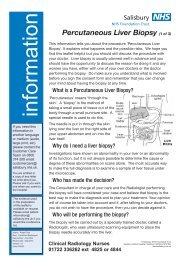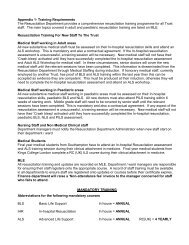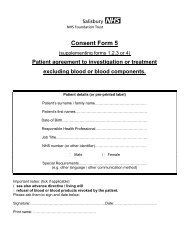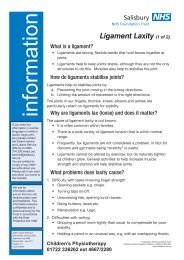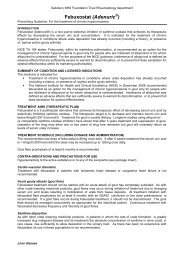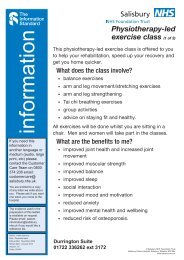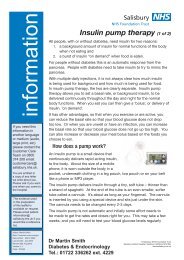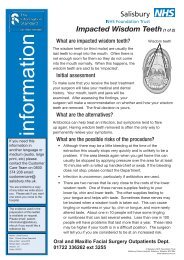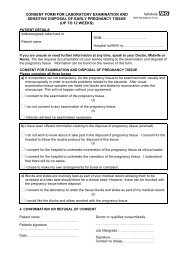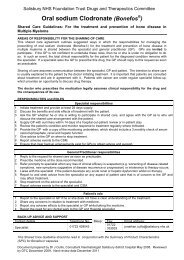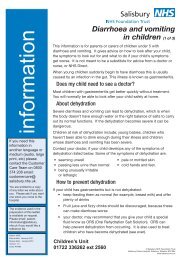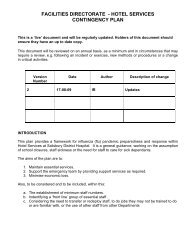Dynamic Hip Screw Operation - ICID - Salisbury NHS Foundation Trust
Dynamic Hip Screw Operation - ICID - Salisbury NHS Foundation Trust
Dynamic Hip Screw Operation - ICID - Salisbury NHS Foundation Trust
Create successful ePaper yourself
Turn your PDF publications into a flip-book with our unique Google optimized e-Paper software.
Fractured Neck of Femur <strong>Dynamic</strong> <strong>Hip</strong> <strong>Screw</strong> <strong>Operation</strong><br />
Information for patients undergoing surgery (4 of 6)<br />
You will have a tube (drip), into your hand or arm replacing any lost fluid with a blood<br />
transfusion or salt solution.<br />
If you have any concerns about blood transfusions, please discuss them with the doctor or<br />
nurse.<br />
It may be necessary for you to have an oxygen mask on for some time after your operation<br />
to help you come round from the anaesthetic.<br />
While you were asleep a catheter tube may have been put into your bladder to drain urine.<br />
This is often left in place until you are back on your feet and able to use a commode or<br />
toilet.<br />
Your pain will be assessed regularly and drugs given to keep you comfortable. Please let us<br />
know if you are in pain or discomfort.<br />
What happens next?<br />
After a short time in the recovery room, a nurse from your ward will come to collect you and<br />
take you back to the ward.<br />
You will continue to have your pain, blood pressure, pulse, breathing and temperature<br />
monitored at regular intervals for some hours after the operation.<br />
You will be prescribed a small daily injection of a drug called ‘Deltaparin’. This thins your<br />
blood slightly and further reduces the risk of blood clots, (thrombosis) in the legs and chest.<br />
You may have some water soon after returning to the ward.<br />
Tea and a light diet will be offered once you are a little less sleepy and any nausea, (sick<br />
feeling), has subsided.<br />
If you do not have a catheter tube, you will be asked to pass urine in a bottle or on a<br />
bedpan within 6 – 12 hours of returning to the ward. If you are unable to pass urine after this<br />
time a catheter may have to be inserted into your bladder to assist you.<br />
It may take a day or two before your bowels open. This is not unusual. The nurses will offer<br />
mild apperients, (laxatives), to assist your bowel actions after this period.<br />
The day after surgery<br />
You should be able to eat and drink as usual. If you are drinking plenty of water, your ‘drip’<br />
will be removed.<br />
A phlebotomist (a person who takes blood samples), will visit you and take some blood<br />
from your arm. This is to ensure that you are not suffering from anaemia as a result of blood<br />
loss during the operation.<br />
It is not always necessary to give patients a blood transfusion; you may be able to have iron<br />
tablets instead.<br />
You will also have the drainage tube removed from your leg and the nurse will redress the<br />
wound.<br />
Contact: Chilmark Ward<br />
Tel: 01722 336262 ext. 3140/3147<br />
© <strong>Salisbury</strong> <strong>NHS</strong> <strong>Foundation</strong> <strong>Trust</strong><br />
<strong>Salisbury</strong> District Hospital, <strong>Salisbury</strong>, Wiltshire SP2 8BJ<br />
www.salisbury.nhs.uk



